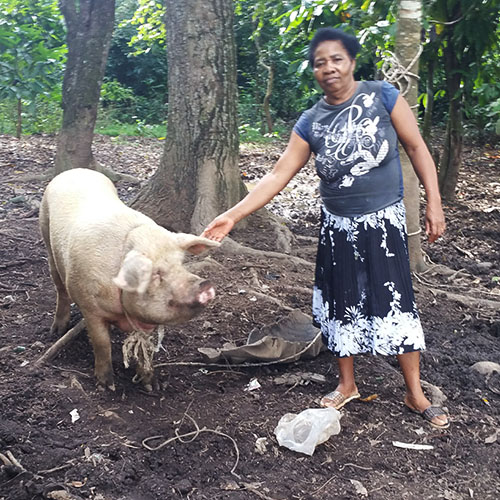Stories of Change

Juliana with her pig. Photo: SSID
This program reached 465 families in 22 communities.
Pigs: a gift with a ripple effect in the Dominican Republic
Sometimes a single gift can have a ripple effect. That is certainly the case in the Dominican Republic for families participating in a CWS- and Foods Resource Bank-supported program. Through a partnership with Servicio Social de Iglesias Dominicanas, this program reached 465 families in 22 communities in a three-year period.
So what was the gift that kept on giving? In this case, it was pigs.
Families who received pigs paid for them by giving piglets to their neighbors and thus enabling more families in their community to raise and sell pigs. Ramona Mota is a widow with three children. She first received a pig five years ago. When 13 piglets were born, four were passed to neighbors. One died, and the remaining eight were sold for $42 each. She used that money to invest in more animals. She says that she has now sold more than 50 animals and made more than $4,000. All from the gift of a single pig.
In the nearby community of La Maya, Juliana de León is also a mother of three. She was also given a pig through the program, and she has been able to sell 23 of the pig’s offspring for $27.50 each. Plus, she gave piglets to six neighbors to raise for their own income. She has made $620 from selling pigs, which she has used to buy pencils, notebooks, uniforms, backpacks, shoes and transportation for her sons to attend school.
For both women, the impact of their income goes beyond just the supplies they can now buy. For Ramona, it means independence despite being a widow. As project agronomist Silverio Agramonte says, “Becoming a widow did not prevent her from growing her business with the help of her three children and neighbors that she hires as day laborers when she needs extra help.” She now has nearly 100 animals.
For Juliana, the pigs have brought her home. She used to work as a domestic worker in the Dominican capital of Santo Domingo and commute back to her community on the weekends. Now, she is able to stay home with her family. Like Silverio says, “Pigs brought Juliana back to her community.”
In the same way that Ramona used her income to invest in additional animals – and thus additional income – Juliana also uses some of her income to invest. “I used some of the money to solve household problems and also to stock a little store I have at home,” she says. Silverio explains, “Juliana’s husband helped her to open a family store, so with the income from pig-raising and the small store she makes as much or sometimes more than what she was making as a domestic worker in the nation’s capital.”
Two mothers and two mother pigs. Together, they reunited a family, started a store, enabled two boys to go to school, yielded more than $4,600 in income and helped a business grow and thrive. They also afforded the same opportunity to 10 other families – and those gifts will keep on going.
